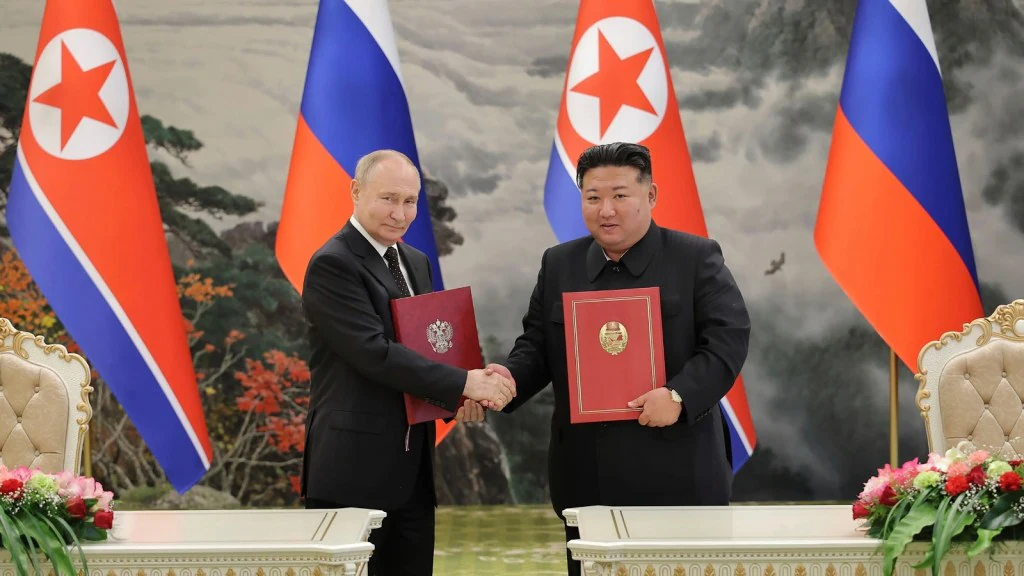In a significant geopolitical maneuver, Russia has recently forged a new pact with North Korea, a move that has sent ripples across the global political landscape. This alliance not only underscores the shifting allegiances in international relations but also raises the stakes in Russia's ongoing confrontation with the West over Ukraine. The implications of this partnership are far-reaching, encompassing military, economic, and strategic dimensions that could reshape the balance of power in the region.

Historical Context and Strategic Motivations
Historically, Russia and North Korea have shared a complex relationship, marked by periods of cooperation and tension. During the Cold War, the Soviet Union was one of North Korea's primary allies, providing economic and military support. However, the dissolution of the Soviet Union in 1991 led to a cooling of relations. In recent years, however, both countries have found common ground in their opposition to Western influence and sanctions, leading to a rekindling of ties.
The current geopolitical landscape provides a fertile ground for this renewed partnership. Russia, under President Vladimir Putin, is keen on countering what it perceives as Western encroachment in its sphere of influence, particularly in Eastern Europe and Central Asia. North Korea, led by Kim Jong-un, is similarly motivated by a desire to counterbalance U.S. influence in East Asia. This convergence of interests has paved the way for a strategic alliance that serves both nations' goals.
The Military Dimension
One of the most critical aspects of this new pact is the potential for military cooperation between Russia and North Korea. Reports suggest that the agreement may include provisions for arms sales, joint military exercises, and intelligence sharing. This development is particularly concerning for the West, as it could lead to a significant enhancement of North Korea's military capabilities.
For Russia, this alliance provides an opportunity to strengthen its military presence in East Asia, a region where it has historically had limited influence. By collaborating with North Korea, Russia can project power more effectively in the Pacific, challenging the U.S. and its allies. Moreover, this partnership allows Russia to leverage North Korea's strategic location and its advanced missile technology, which could be crucial in any future conflict with Western powers.
Economic Cooperation and Sanctions Evasion
Economic cooperation is another cornerstone of the Russia-North Korea pact. Both countries are heavily sanctioned by the West, and their economies have suffered as a result. By working together, they can develop strategies to circumvent these sanctions and bolster their economic resilience.
For instance, Russia can provide North Korea with much-needed energy supplies, such as oil and natural gas, in exchange for labor and raw materials. Additionally, joint ventures in mining and infrastructure development could benefit both nations. This economic interdependence not only strengthens the bilateral relationship but also creates a buffer against Western economic pressure.
Moreover, the pact could facilitate the establishment of clandestine networks for trade and financial transactions, allowing both countries to evade sanctions more effectively. This cooperation could undermine the effectiveness of Western sanctions and provide a model for other sanctioned states to follow.
Geopolitical Implications
The Russia-North Korea alliance has significant geopolitical implications, particularly for the ongoing conflict in Ukraine. By strengthening its ties with North Korea, Russia is signaling to the West that it has alternative alliances and can withstand international isolation. This move could embolden Russia in its actions in Ukraine, as it demonstrates that it is not entirely dependent on Western markets and partnerships.
Furthermore, this alliance could complicate the West's efforts to contain Russia's influence. The U.S. and its allies may need to divert more resources to address the growing threat from this new axis of cooperation. This could lead to a broader reallocation of military and economic resources, straining Western capabilities.
The partnership also has implications for China, another key player in the region. While China has traditionally been North Korea's main ally, the Russia-North Korea pact introduces a new dynamic that could either complement or complicate China's strategic interests. Beijing may welcome the additional pressure on the West but will also be cautious about the potential for increased Russian influence in East Asia.
The Response from the West
The West's response to this new alliance is likely to be multifaceted, involving diplomatic, economic, and military strategies. On the diplomatic front, the U.S. and its allies will likely intensify efforts to isolate both Russia and North Korea on the international stage. This could include pushing for more stringent sanctions and seeking to build a broader coalition of countries to counter this new axis.
Economically, the West may look to tighten existing sanctions and close any loopholes that Russia and North Korea could exploit. This could involve targeting specific sectors or individuals involved in facilitating the bilateral trade between the two nations. Additionally, efforts to support opposition movements within Russia and North Korea could be intensified, aiming to destabilize the regimes from within.
Militarily, the West may increase its presence in Eastern Europe and East Asia to counter the growing threat. This could involve deploying more troops and advanced weaponry to these regions, as well as conducting more frequent and larger-scale military exercises. The goal would be to deter any aggressive actions by Russia and North Korea and reassure allies in these regions of the West's commitment to their security.
The new pact between Russia and North Korea represents a significant escalation in the geopolitical chess game between Russia and the West. By aligning more closely with Pyongyang, Moscow is not only seeking to bolster its strategic position but also sending a clear message to the West: it has the means and the will to resist Western pressure.
This alliance has the potential to reshape the dynamics of the ongoing conflict in Ukraine and could lead to a broader reconfiguration of global power structures. As the West grapples with this new reality, it will need to develop a comprehensive strategy that addresses the multifaceted challenges posed by this emerging axis of cooperation.
Ultimately, the Russia-North Korea pact underscores the importance of understanding and adapting to the complex and evolving nature of international relations. In a world where alliances can shift rapidly, staying ahead of the curve is essential for maintaining global stability and security. The coming months and years will be critical in determining how this new partnership will impact the broader geopolitical landscape and whether the West can effectively counter this growing threat.


You must be logged in to post a comment.